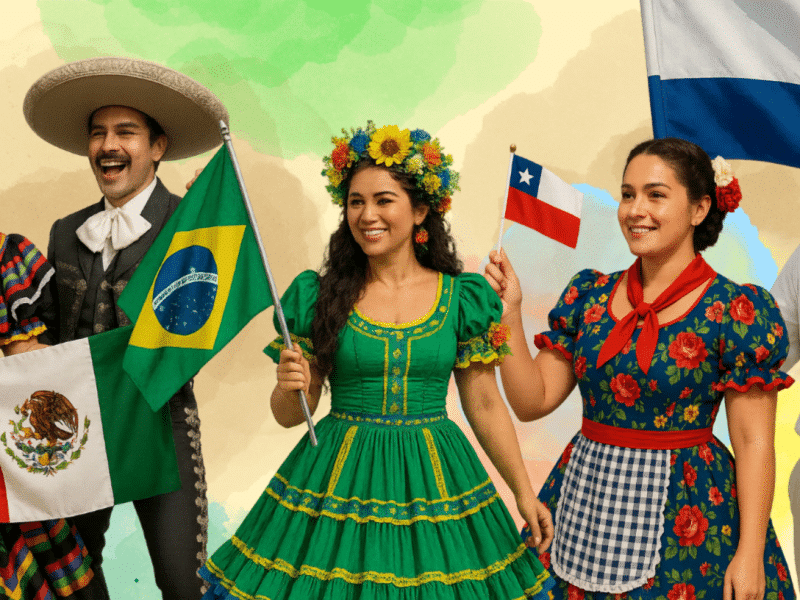Expat If You’re an American in Latin America, Immigrant If You’re a Latino in the U.S.
As the cost of living in the U.S. continues to rise, many Americans continue heading to Latin America in search of a better lifestyle. But while they’re called “expats,” Latinos making the reverse journey for the same reasons are always labeled “immigrants,” even when the term doesn’t apply.

Recent data from the Consumer Price Index (CPI) revealed that prices increased by 2.3 percent between April 2024 and April 2025. In terms of inflation, that’s a notable decrease from the 9.1 percent increase recorded in June 2022. However, inflation being down doesn’t necessarily mean the cost of living is getting lower. Quite the contrary. Factors like income stagnation, transportation expenses, housing costs, and debt burden, among others, make living in the U.S. very expensive. In fact, the U.S. is currently the 13th most expensive country to live in, according to a report from Numbeo.
The American Exodus: Moving Abroad for a Better Life
With this in mind, it’s not surprising that Americans seem to be flocking to Latin America to retire, work, enjoy a lower cost of living, and even invest. In 2023, the Association of Americans Resident Overseas (AARO) estimated that 5.5 million U.S. citizens live overseas. 1,182,346 million of them live in Mexico. Looking at Mexico City alone, the number of Americans who applied for residency visas or renewed them rose by 70% between 2019 and 2022, as reported by CNBC. It’s worth noting that the influx of Americans, including digital nomads, has sparked gentrification concerns among locals.
The disparity in income between Americans and locals increases tensions, leading to rising rents and the displacement of native residents. While Airbnb and the Mexican government promote the city as a remote work hub, locals demand regulation to preserve their communities.
Expats vs. Immigrants: A Biased Distinction
One interesting thing worth noting is that while Americans who relocate to Latin America in search of a more comfortable life are called “expats” (short for expatriate), Latinos who do the same by relocating to the United States are called “immigrants.” But what makes one an expat and the other an immigrant? The basic definition of expat is a person who lives outside of their native country temporarily or permanently, often for work, study, or lifestyle reasons. On the other hand, an immigrant is someone who moves to a country with the intention of settling there permanently, often to build a new life. The term often applies to people seeking permanent residence, family reunification, better economic opportunities, or refuge.
Any person who leaves their country to work, study, or improve their lifestyle in another country would be considered an expat, but what’s interesting is that the term expat is usually reserved for Western white people, regardless of the context behind their decision to relocate, even in cases where “immigrant” would be an accurate description of their status. For Latinos, Asians, Arabs, and Africans, the term always tends to be immigrant, no matter the context.
The Power of Perception: Language, Class, and Race
The issue here is the connotation associated with each of these terms. The term “expat” is commonly associated with people from wealthier backgrounds who relocate for career opportunities, retirement, or simple adventure. They’re deemed adventurous and successful. “Immigrant,” on the other hand, is associated with an often hateful rhetoric. They’re deemed criminals, uneducated, underqualified, and more. This distinction, based on social class, economic status, country of origin, and education level, reflects social and racial biases. The terms have become hierarchical, and implicit bias is the reason why Westerners are always expats, and everyone else is an immigrant.
You could be a highly educated Latino living in the U.S. because you were sent to work there in a multinational organization, and you wouldn’t be perceived as an expat, you would be perceived as an immigrant. You could be a wealthy Latina who decided to move to the U.S. seeking a more cosmopolitan lifestyle, and you would be called an immigrant, not an expat. At best, you would be perceived as a qualified immigrant. If you were a white person, whether you were educated or not, whether you had a high-paying job or not, you would be perceived as an expat across the board. That’s how race, education level, and income are unfairly used as indicators to distinguish between people.
The fact is that expats can be immigrants. What determines that is whether they seek legal integration or not, because they want to work abroad, want to take advantage of Latin America’s lower cost of living to take the most advantage of their dollars, or simply because they want a change of scenery. For most Latin Americans and other people of color who leave their countries, seeking legal integration is a matter of necessity because the alternative of staying is unsustainable for them. Whether that’s because of poverty, food insecurity, violence, political persecution, or even war, the fact is that they have to leave to truly seek a better life.
Redefining the Narrative Around Immigrants
As of 2024, there are 20.4 million Latino immigrants living in the U.S. As for international immigrants, the count was nearly 46.2 million in 2022. While the word immigrant may be reserved for people of color and may carry some negative connotations due to implicit bias, systemic racism, and the inflammatory narrative pushed by the Trump administration, being an immigrant is nothing to be ashamed of.
People from all over the world and from all walks of life partake in immigration. Especially now that many are embracing a more nomadic lifestyle with the rise of remote work. This is why it’s important to recognize subtly racist distinctions, call them out, and confront them to prevent the prevalence of a “them versus us” narrative that only holds people back.




